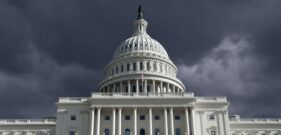It Is Not Clear that the Speaker Needs to Be a Member of the House
In a post last week, Diana Schaub argues that the Speaker of the House must be a member of the House of Representatives. Here is the initial part of her argument:
There is an inescapable logic to the setting forth of the Constitution’s sections which should guide interpretation. In Article 1, Section 1, we learn that Congress is vested with specified legislative powers and that Congress “shall consist of a Senate and House of Representatives.” In Article 1, Section 2, Clause 1, we learn that “The House of Representatives shall be composed of Members chosen every second Year by the People of the several States.”
These definitions govern the meaning of subsequent clauses. I admit that it would have put the kibosh on the present foolishness if the fifth clause had included the words in italics: “The House of Representatives shall choose from among their number their Speaker.” I think it simply never occurred to them that someone would take it into his head to contend that the Speaker of the House could be an individual who was not a fellow legislator. The possessive pronoun is important. The House chooses “their” Speaker—a Speaker, we might say, who is of the House, by the House, and for the House. According to Article 1, Section 2, Clause 1, the House is composed of members and only members. The existing members of the House cannot summon into being a new member. The drafters thought the chain of connection from Sections 1 and 2 to Section 5 was clear enough; and for over 200 years, it was.
The first Congress clearly thought the Speaker must be drawn from the current membership. When they assembled on April 1, 1789, the first order of business was the drafting of rules. By April 7, they had adopted the “STANDING RULES and ORDERS of this HOUSE,” the first of which laid out “the DUTY of the SPEAKER.” Among the duties:
In all cases of ballot by the house, the speaker shall vote; in other cases he shall not vote, unless the house be equally divided, or unless his vote, if given to the minority, will make the division equal, and in case of such equal division, the question shall be lost.
The remainder of the post provides some additional arguments based on the qualifications, privilege from arrest, and oath clauses. Mike Ramsey is inclined to agree.
I am not so sure. To me, it is at best an open question that turns on the history.
The key text concerning the matter is in Article 1, Section 2, Clause 5, which provides: “The House of Representatives shall choose their Speaker” (emphasis added). By itself, this imposes no explicit requirement that the Speaker be a member of the House. So how can one find that restriction?
Schaub argues that the term “their” is important. She says it implies that the Speaker should be “of the House.” And the Constitution defines the House to consist of Members chosen every second year – that is, representatives. Therefore, she concludes the Speaker must be a member of the House.
I suppose one could read “their” that way, but it is not the ordinary way one would read the term. Moreover, the Constitution does not express any implicit criticism of a presiding officer not be a member of a house. On the contrary, the Constitution provides that the Vice President “shall be President of the Senate,” yet it is clear that the Vice President is not a member of the Senate, which the Constitution says “shall be composed of two Senators from each state.”
Schaub is correct that first House’s rules seemed to imply that the Speaker should be a member, but that does not mean the Constitution requires it. The Constitution allows each house to pass rules and those rules can set the parameters as to who can be an officer of the house. Thus, the first House’s rules do not necessarily indicate anything about the Constitution’s meaning.
The best argument for the conclusion that the Speaker must be a member of the House is mentioned by Ramsey and is historical. Let’s assume that the Speaker of the House of Commons in England had long been required to be a member. Then one might conclude that the term Speaker had associated with it the requirement of being a member of the House: that is what people meant, in a legal context, by a Speaker. There appears to have been an interpretive rule at the time of the Constitution to refer to legal institutions as containing their historical incidents. Under these circumstances, one might conclude that a speaker had to be a member of the House.
But even if Speakers were traditionally required to be a member of the House, I would think it would only be a possible meaning of the term, not a required meaning. One would have to resolve the uncertainty by reference to other interpretive rules, such as purpose and structure. Considering constitutional purpose, it is not clear to me that the Constitution was intended to preclude the House from making its own determination who to have as a Speaker.
This analysis has assumed that the traditional rule required the Speaker to be a member of the House of Commons. But that is not clear. Wikipedia, which Ramsey cites, merely says that the Speaker was a member of the House, not that the Speaker was required to be a member. If that is what the history shows, the argument is considerably weaker.
